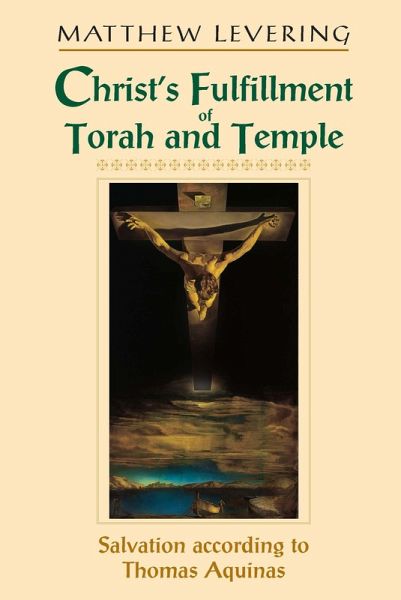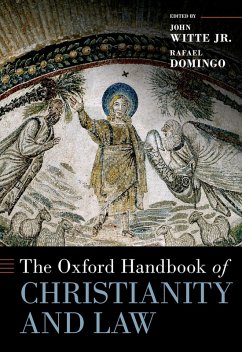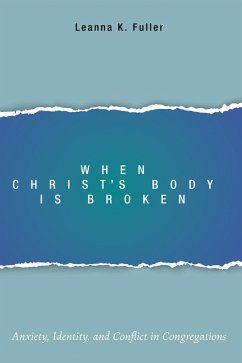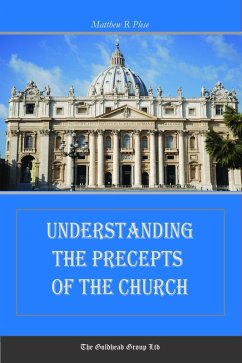
Christ's Fulfillment of Torah and Temple (eBook, ePUB)
Salvation according to Thomas Aquinas
Versandkostenfrei!
Sofort per Download lieferbar
17,95 €
inkl. MwSt.
Weitere Ausgaben:

PAYBACK Punkte
9 °P sammeln!
Christ's Fulfillment of Torah and Temple is a concise introduction to the Christian theology of salvation in light of the contributions of Thomas Aquinas. In this cogent study, Matthew Levering identifies six important aspects of soteriology, each of which corresponds to an individual chapter in the book. Levering focuses on human history understood in light of the divine law and covenants, Jesus the Incarnate Son of God and Messiah of Israel, Jesus' cross, transformation in the image of God, the Mystical Body of Christ into which all human beings are called, and eternal life.Taking the doctri...
Christ's Fulfillment of Torah and Temple is a concise introduction to the Christian theology of salvation in light of the contributions of Thomas Aquinas. In this cogent study, Matthew Levering identifies six important aspects of soteriology, each of which corresponds to an individual chapter in the book. Levering focuses on human history understood in light of the divine law and covenants, Jesus the Incarnate Son of God and Messiah of Israel, Jesus' cross, transformation in the image of God, the Mystical Body of Christ into which all human beings are called, and eternal life.
Taking the doctrines of faith as his starting point, Levering's objective is to answer the questions of both Christians and non-Christians who desire to learn how and for what end Jesus "saves" humankind. Levering's work also speaks directly to contemporary systematic theologians. In contrast to widespread assumptions that Aquinas's theology of salvation is overly abstract or juridical, Levering demonstrates that Aquinas's theology of salvation flows from his reading of Scripture and deserves a central place in contemporary discussions.
Thomas Aquinas's theology of salvation employs and develops the concepts of satisfaction and merit in light of his theology of the Old Testament. For Aquinas, Christ fulfills Israel's Torah and Temple, law and liturgy. These two aspects of Israel's religion provide the central categories for understanding salvation. The Torah expresses God's Wisdom, incarnated in Jesus Christ. Christ's passion, then, fulfills and transforms the moral, juridical, and ceremonial precepts of the Torah, which correspond to the three "offices" of ancient Israel-prophet, king, and priest. The New Law in Christ Jesus is also the fulfillment of the Temple, Israel's worship. Christ offers the Father the perfect worship, participated in by all members of his Mystical Body through faith, charity, and the sacraments. Old Law and New Law are fulfilled in the perfect knowing and loving (perfect law and liturgy) of eternal life, the Heavenly Jerusalem.
As a Thomistic contribution to contemporary theology, this fruitful study develops a theology of salvation in accord with contemporary canonical readings of Scripture and with the teachings of the Second Vatican Council on the fulfillment and permanence of God's covenants.
Taking the doctrines of faith as his starting point, Levering's objective is to answer the questions of both Christians and non-Christians who desire to learn how and for what end Jesus "saves" humankind. Levering's work also speaks directly to contemporary systematic theologians. In contrast to widespread assumptions that Aquinas's theology of salvation is overly abstract or juridical, Levering demonstrates that Aquinas's theology of salvation flows from his reading of Scripture and deserves a central place in contemporary discussions.
Thomas Aquinas's theology of salvation employs and develops the concepts of satisfaction and merit in light of his theology of the Old Testament. For Aquinas, Christ fulfills Israel's Torah and Temple, law and liturgy. These two aspects of Israel's religion provide the central categories for understanding salvation. The Torah expresses God's Wisdom, incarnated in Jesus Christ. Christ's passion, then, fulfills and transforms the moral, juridical, and ceremonial precepts of the Torah, which correspond to the three "offices" of ancient Israel-prophet, king, and priest. The New Law in Christ Jesus is also the fulfillment of the Temple, Israel's worship. Christ offers the Father the perfect worship, participated in by all members of his Mystical Body through faith, charity, and the sacraments. Old Law and New Law are fulfilled in the perfect knowing and loving (perfect law and liturgy) of eternal life, the Heavenly Jerusalem.
As a Thomistic contribution to contemporary theology, this fruitful study develops a theology of salvation in accord with contemporary canonical readings of Scripture and with the teachings of the Second Vatican Council on the fulfillment and permanence of God's covenants.
Dieser Download kann aus rechtlichen Gründen nur mit Rechnungsadresse in A, D ausgeliefert werden.













